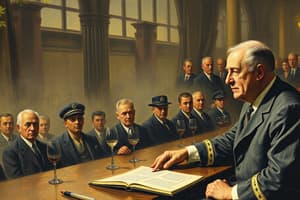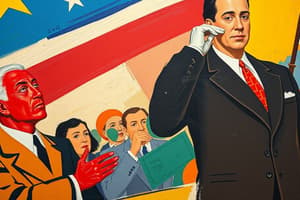Podcast
Questions and Answers
What were the four freedoms identified by Franklin D. Roosevelt?
What were the four freedoms identified by Franklin D. Roosevelt?
- Freedom of speech, freedom from fear, freedom from want, freedom of worship (correct)
- Freedom of speech, freedom of movement, freedom from fear, freedom of assembly
- Freedom from oppression, freedom of religion, freedom from want, freedom of speech
- Freedom of the press, freedom of assembly, freedom from want, freedom from fear
What impact did the Civil Rights Act of 1964 have on Jim Crow laws?
What impact did the Civil Rights Act of 1964 have on Jim Crow laws?
- It led to the rise of new segregation laws.
- It enforced voter ID laws.
- It marked a significant turning point in the dismantling of Jim Crow. (correct)
- It institutionalized segregation policies.
What was the primary consequence of the Cuban Missile Crisis?
What was the primary consequence of the Cuban Missile Crisis?
- Immediate nuclear disarmament by both countries.
- The establishment of NATO.
- A permanent end to the arms race.
- Increased communication between the US and USSR during the Cold War. (correct)
What was one key component of LBJ's foreign policy during the Vietnam War?
What was one key component of LBJ's foreign policy during the Vietnam War?
What did the Voting Rights Act of 1965 aim to address?
What did the Voting Rights Act of 1965 aim to address?
What was Nixon's 'Southern Strategy' primarily aimed at?
What was Nixon's 'Southern Strategy' primarily aimed at?
What event is referred to as a 'year of violence' in 1968?
What event is referred to as a 'year of violence' in 1968?
What was the significance of the Watergate scandal in relation to Congress?
What was the significance of the Watergate scandal in relation to Congress?
What was a major concern of President H.W. Bush regarding Germany?
What was a major concern of President H.W. Bush regarding Germany?
Which strategy characterized Bush's foreign policy approach during the Iraq conflict?
Which strategy characterized Bush's foreign policy approach during the Iraq conflict?
What was one of the main actions of the Obama administration regarding Cuba?
What was one of the main actions of the Obama administration regarding Cuba?
What did the Good Friday Agreement aim to address?
What did the Good Friday Agreement aim to address?
What was a critical outcome of Reagan's foreign policy related to the Soviet Union?
What was a critical outcome of Reagan's foreign policy related to the Soviet Union?
Which event is associated with the emergence of the Black Lives Matter movement?
Which event is associated with the emergence of the Black Lives Matter movement?
What policy change did Obama implement regarding travel to Cuba?
What policy change did Obama implement regarding travel to Cuba?
What was a consequence of the Iraq War according to critics?
What was a consequence of the Iraq War according to critics?
What did the term 'Doctrines of Enlargement' refer to?
What did the term 'Doctrines of Enlargement' refer to?
What was a significant aspect of the relationship between Trump and Netanyahu?
What was a significant aspect of the relationship between Trump and Netanyahu?
Flashcards
FDR's Two-Term Limit
FDR's Two-Term Limit
Franklin D. Roosevelt served four terms as president, challenging the traditional two-term limit.
Four Freedoms
Four Freedoms
Freedom from fear, want, worship, and speech were advocated during World War II.
Cuban Missile Crisis
Cuban Missile Crisis
A 13-day confrontation between the US and the USSR in 1962 over Soviet missiles in Cuba, nearly escalating to nuclear war.
Brown v. Board of Education
Brown v. Board of Education
Signup and view all the flashcards
Civil Rights Act of 1964
Civil Rights Act of 1964
Signup and view all the flashcards
Watergate Scandal
Watergate Scandal
Signup and view all the flashcards
Détente
Détente
Signup and view all the flashcards
Korean War
Korean War
Signup and view all the flashcards
Soviet Invasion of Afghanistan
Soviet Invasion of Afghanistan
Signup and view all the flashcards
Reagan's 'Trust but Verify'
Reagan's 'Trust but Verify'
Signup and view all the flashcards
German Reunification
German Reunification
Signup and view all the flashcards
Reaganomics
Reaganomics
Signup and view all the flashcards
Clinton's Multilateralism
Clinton's Multilateralism
Signup and view all the flashcards
Bush's Unilateralism
Bush's Unilateralism
Signup and view all the flashcards
Neoconservatives
Neoconservatives
Signup and view all the flashcards
Ebola Outbreak
Ebola Outbreak
Signup and view all the flashcards
Obama's easing of Cuba relations
Obama's easing of Cuba relations
Signup and view all the flashcards
Hyper-partisanship
Hyper-partisanship
Signup and view all the flashcards
Study Notes
The Modern Presidency: Franklin D. Roosevelt
- FDR served only two terms as president
- FDR's Four Freedoms: Freedom from fear, want, worship, and speech.
- "Uncle Joe" was a nickname for Stalin.
- End of WWII: Russian army refused to leave Poland.
Key Events and Policies
- NATO (1949) and Warsaw Pact (1955): Key Cold War alliances.
- Pearl Harbor (1941): Attack on the US that led to entry into WWII. There is disagreement about the restorative actions needed on global empires.
- Civil Rights: Brown v. Board of Education court cases (1952-55) aimed to desegregate and ended Jim Crow. Brown I was the landmark case against segregation in schools. Brown II was about how to desegregate, how it would happen and was it deliberate segregation.
- Civil Rights Act (1964): Landmark legislation ending Jim Crow.
- Voting Rights Act (1965): Act motivated by civil rights act of 1964.
- HUAC (House Un-American Activities Committee): Investigated suspected communists.
- Korean War (1950-53): The US and USSR were close within their respective geopolitical conflicts, and Stalin even armed North Korea.
- Cuban Missile Crisis (1962): 13-day confrontation, nearly led to nuclear war.
- LBJ's Presidency: Inherited and followed JFK's policies in the short term but embraced the long term domino theory to further contain soviet involvement.
- 1968 "Violence Year": Urban riots following Martin Luther King's assassination. A Chicago Democratic convention of tumult.
- Nixon's Presidency: Promoted a "law and order" agenda, targeting specific ideologies and appealing to the "silent majority" and attracting southern votes. His “peace with honor” policy and cultural diplomacy made him effective in peace-time. He was consistently anti-communist in his approach.
- Watergate: Scandal causing Nixon's resignation, reporting occurred among his own party and led to major investigations.
- Ford's Presidency: Short term, a lack of legitimacy
- CIA "Family Jewels": Uncovered controversial activities. A controversial report detailing actions of the CIA, especially in Latin America, including coups under Eisenhower and assassination attempts.
- Cold War's Human Toll: CIA involvement in Latin American coups and foreign leader assassinations happened under Eisenhower.
Post-Watergate Reforms
- Congressional oversight and investigations of the white house, related to domestic operations, occurred post-Watergate scandal.
US-Soviet Relations
- Reagan's Presidency: Reagan's strong personality and optimistic rhetoric, along with Gorbachev's willingness to meet, improved US-Soviet relations. "Trust, but verify" and the concept of an "evil empire".
- Bush Sr.'s Presidency: Concerned with the quick reunification of Germany.
- Carter's Presidency: Boycotted the 1980 Olympics due to the Soviet invasion of Afghanistan; worsening relations.
Economic Policy
- Reaganomics: Focus on economic policies.
- 1992: Economic issues.
Foreign Policy
- Bush Sr.'s Foreign Policy: Focused on multilateralism.
- Clinton’s Foreign Policy: Clinton's approach was to work with others. Examples are involvement in Somalia, Rwanda, Haiti, and the good friday agreement.
- Foreign Policy and Hyper-partisanship: Hyper partisanship occurred in relation to Republican and Democrat party's differences, and was a result of the issue in foreign aid when deciding on what was best and better for countries.
- 1994 Republican Revolution: Republicans gaining control of Congress in 1994.
- Iraq Invasion (2003): Bush's foreign policy. France, Germany, and Mexico were not in favour.
- Unilateralism: US acted on its own without allies or international law. Militaristic, ideological, expensive, and unpopular in the 2003 Iraq war.
- "Axis of Evil": Bush’s term for nations threatening US security.
- Foreign Aid: Bush Sr and Clinton. Concerns in how best to provide aid were made in Clinton's presidency.
- Black Lives Matter: Founded in 2013 after the killing of Trayvon Martin.
- Cuba: US policy of "wet foot, dry foot" eased, and diplomatic ties reopened in the Obama Administration.
- Saudi Arabia: Trump's visit; Jamal Khashoggi's death.
- Israel: Trump supporting Netanyahu, US embassy in Jerusalem.
Global Health Emergencies
- Ebola outbreak: West Africa (2014-2016) and COVID-19
Impeachments
- Nixon wasn't impeached
- Johnson was (1868)
- Nixon (1973-74)
- Clinton (1998)
- Trump (2019, 2021)
Studying That Suits You
Use AI to generate personalized quizzes and flashcards to suit your learning preferences.




